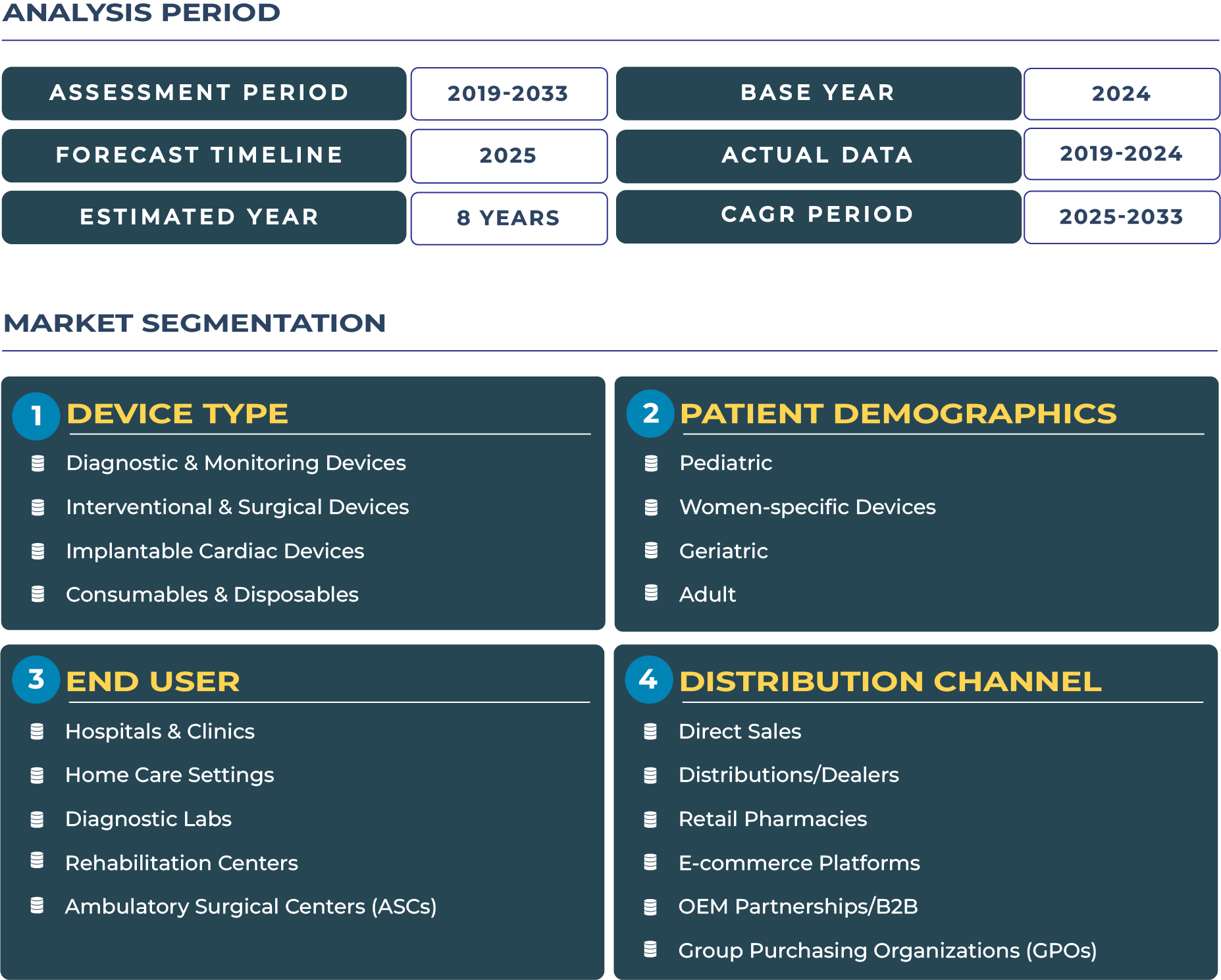Nigeria Cardiovascular Devices Market Outlook: Expanding Urban Healthcare Infrastructure Unlocking Cardiovascular Opportunities in Nigeria
The Nigeria cardiovascular devices market is on an upward trajectory, supported by urbanization, rising lifestyle-related cardiovascular conditions, and private healthcare investment. In 2025, the market is expected to reach USD 136.6 million and is projected to grow steadily, attaining USD 254.5 million by 2033, at a compound annual growth rate (CAGR) of 8.1%. This performance reflects the dual forces of rising healthcare demand in metropolitan hubs and increasing affordability of diagnostic and surgical interventions. Urban private hospitals are playing a crucial role in boosting adoption, often collaborating with mobile telecom providers to integrate monitoring and reporting systems. Furthermore, the increasing demand for interventional and surgical devices for minimally invasive cardiac procedures is enabling hospitals to reduce patient recovery times and improve outcomes. Consumables and disposables, especially stents and catheters, are gaining traction due to their role in both emergency interventions and planned surgical procedures. Despite infrastructural constraints in rural areas, Nigeria’s urban ecosystem is building a sustainable path for the cardiovascular devices sector, making it a critical market within Sub-Saharan Africa.
Urban Cardiac Adoption Driving Growth in Nigeria Cardiovascular Devices Market
Nigeria stands out as a cardiovascular devices market where urban demand and increasing connectivity are catalyzing adoption. With a rapidly expanding urban population and rising lifestyle-related health concerns, private hospitals in cities like Lagos, Abuja, and Port Harcourt are leading the deployment of cardiovascular technologies. Mobile penetration and the integration of remote monitoring solutions are bridging accessibility gaps, allowing patients to receive continuous care even outside hospital premises. The increasing adoption of consumables and disposables in diagnostic and interventional procedures further demonstrates how urban healthcare institutions are reshaping the cardiovascular devices landscape. These dynamics highlight Nigeria’s transition into an urban-driven cardiovascular devices ecosystem that thrives on affordability, connectivity, and the commitment of private players to address unmet needs.
Drivers & Restraints: Understanding Nigeria Cardiovascular Devices Market Growth
Drivers: Urban demand and connectivity fueling adoption
Nigeria’s large and growing population, exceeding 220 million, presents a substantial demand pool for cardiovascular care. The private healthcare sector has been proactive in filling the gaps left by public facilities, particularly in urban regions. Increasing mobile penetration, with nearly 200 million active lines, has enabled integration of remote monitoring devices, thereby boosting adoption of diagnostic and implantable cardiac devices. Lifestyle changes driven by urbanization have escalated the incidence of hypertension and heart disease, further driving hospital and clinic demand for interventional solutions. Rising disposable incomes in cities and expansion of private health insurance also underpin this growing demand.
Restraints: Infrastructure and regulatory hurdles slowing rural penetration
Despite urban growth, Nigeria faces systemic challenges. Weak healthcare infrastructure in rural regions hampers equitable adoption of cardiovascular devices. With per-capita healthcare expenditure still below the African average, affordability remains a barrier. Regulatory and logistics challenges, including complex customs processes and inconsistent regulatory approvals, delay the entry of advanced cardiovascular solutions. Additionally, uneven distribution of skilled cardiologists and technicians limits utilization of sophisticated devices. These barriers highlight that while urban centers are surging ahead, broader national adoption will require structural reforms and sustained investments in healthcare infrastructure.
Trends & Opportunities: Shaping the Future of Nigeria’s Cardiovascular Devices Ecosystem
Trends: Mobile-based monitoring and private clinic momentum
A key trend is the integration of mobile-based cardiovascular monitoring systems, enabled by Nigeria’s robust telecom sector. Patients in cities now benefit from wearable devices connected to mobile platforms that allow continuous monitoring, which is vital for post-surgery and chronic disease management. Private clinics and hospitals are rapidly investing in minimally invasive surgical devices and diagnostic imaging systems to cater to affluent urban populations. Rising demand for consumables such as catheters and stents is reshaping procurement strategies among private hospitals.
Opportunities: Partnerships and affordability unlocking new growth
Emerging opportunities lie in partnerships between telecom operators and device manufacturers for remote cardiac monitoring, which could scale adoption across both urban and semi-urban areas. Urban private hospitals represent lucrative entry points for companies offering bundled device-service models. Moreover, the demand for low-cost consumables is opening the door for localized production, which can reduce import dependency and enhance affordability. Global players can leverage these opportunities by aligning with Nigeria’s healthcare modernization agenda, while local firms can expand reach through cost-effective innovations.
Competitive Landscape: Strategies Defining Nigeria’s Cardiovascular Devices Market
The Nigeria cardiovascular devices market features both international players such as Medtronic and Abbott alongside local distributors that focus on consumables and monitoring solutions. Companies are increasingly targeting private urban hospitals with device bundles that integrate telemonitoring, reflecting the growing demand for continuous cardiac care. In 2024, several private hospitals in Lagos initiated pilots with telemonitoring kits, enabling cardiologists to track patient vitals remotely. Consumables demand also surged as hospitals increased purchases of stents and catheters to manage rising cases of coronary artery disease. Low-cost device models, particularly in diagnostic and monitoring categories, are being introduced to cater to affordability constraints, while partnerships with telecom providers are shaping new distribution models. These strategies underscore the growing significance of urban-driven, technology-enabled cardiovascular devices adoption in Nigeria.







